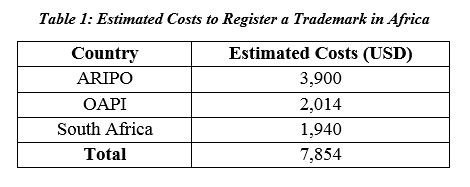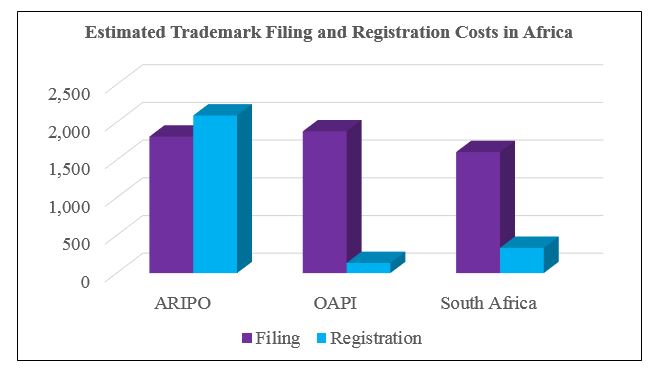
Brand Protection in Africa: Trademark Filing and Registration Costs
Published on 28 April 2018
In a previous article published in IPWatchdog, The Costs of Patenting in Africa: A Tale of Three Intellectual Property Systems, we discussed the patent registration systems in Africa and the costs involved. In this article, we turn the spotlight to the costs of brand protection (i.e. the costs of trademark filing and registration) in Africa.
Economic Potential
Over the last decade, the African continent has made significant strides in its march towards development, which, in turn, has created a favorable investment climate. This trend has augured well for investors, leading to the creation and development of brands to harness the increased demand for products and services. The International Trademark Association heralded Africa's foray onto the world stage about a year and a half back, when it held its first conference on African soil in September 2016.
The growth momentum is projected to be sustained this year as well. As per the recently published Global Economic Prospects report from the World Bank, the economy is set to grow at 3.2%, which is on par with the global average of 3.5%, and is expected to encompass six of the top ten fastest growing economies.
Trademark Registration Systems in Africa
Trademark registration systems in Africa are peculiar and comprise a complicated mix of National and Regional systems. There are two Regional Trademark organizations (i.e. centralized trademark filing systems) in Africa, which account for approximately 50% of the countries that make up the continent, with most of the other countries having their own national trademark legislations.
African Regional Intellectual Property Organization ("ARIPO")
ARIPO was established in 1976 under the auspices of the Lusaka Agreement. The organization is comprised of 19 member states, most of which are English-speaking economies. Over the last 40 years, ARIPO has played a significant role in shaping the Intellectual Property landscape in Africa.
A confusing, yet interesting aspect of ARIPO, is the fact that it is empowered by separate protocols to grant each type of Intellectual Property, with these protocols not being in force in all the member states.
The designation-based trademark registration system in ARIPO is governed by the Banjul Protocol on Marks, which was adopted in 1993 and came into force on 6 March 1997. Only ten out of ARIPO's 19 member states are currently signatories to the Banjul Protocol: Botswana, Lesotho, Liberia, Malawi, Namibia, São Tomé & Príncipe, Swaziland, Tanzania, Uganda, and Zimbabwe.
In contrast to the other regional trademark protection systems, one of the advantages of the ARIPO system is that a mark which has been rejected in one or more of the designated member states can still proceed to registration in the other designated member states.
Four factors influence the costs of trademark filing and registration in ARIPO: the number of trademarks being applied for; the mode of filing (i.e. electronic v. non-electronic); the number of classes of goods and/or services included in each trademark application; and the number of designated member states.
Organisation Africaine de la Propriété Intellectuelle ("OAPI")
The trademark filing system in ARIPO's sister organization, OAPI, is based on the Bangui Agreement of 1977. Unlike ARIPO, OAPI is not empowered by separate protocols to grant each type of Intellectual Property.
The organization is comprised of 17 member states: Benin, Burkina Faso, Cameroon, Central African Republic, Chad, Congo, Equatorial Guinea, Gabon, Guinea, Guinea-Bissau, Ivory Coast, Mali, Mauritania, Niger, Senegal, Togo, and Union of the Comoros.
OAPI's member states are treated as one state for the purposes of trademark registration (i.e. OAPI's trademark system is of unitary character and is not designation-based). All the 17 member countries of OAPI are, thus, automatically covered under a single trademark application. This unitary nature of the OAPI trademark system is similar to that of the trademark system administered by the European Union Intellectual Property Office, with the major difference being that the member states of OAPI do not have National Intellectual Property legislations.
Three factors influence the costs of trademark filing and registration in OAPI: the number of trademarks being applied for; the number of classes of goods and/or services included in each trademark application; and the number of priority applications.
National Trademark Systems and South Africa
Apart from the OAPI member states, most African jurisdictions have national trademark systems in place. For example, national registration is the only method possible in South Africa, which is neither a member of ARIPO nor a member of OAPI. As per the World Intellectual Property 2017 Indicators report published by the World Intellectual Property Organization, South Africa was the most sought after jurisdiction within Africa for the filing of trademarks in 2016, having received close to 38,000 applications.
Brand Protection Costs in Africa
Typically, there are two categories of costs involved in filing trademark applications in Africa and, subsequently, getting them registered; these are official fees and attorney charges.
The costs are generally dependent on the number of classes of goods and services under which the trademark applications are filed and the number of designations in the ARIPO application. The current version of ‘International Classification of Goods and Services' (Nice Agreement Eleventh Edition – Version 2018) contains 34 classes for goods and 11 classes for services.
Let us consider a trademark application that is to be filed electronically under three classes in ARIPO, OAPI, and South Africa, with the ARIPO application containing three designations. For instance, the applicant could be a travel organizer wishing to register under Class 36 (Insurance), Class 39 (Travel Arrangement), and Class 41 (Education). Further, we shall consider that the applications include a priority claim to an application initially filed in the U.S.
The estimated costs of the trademark process under three classes in ARIPO, OAPI, and South Africa, from filing through registration, add up to approximately $7,850 (Table 1). The costs are inclusive of Value Added Tax (applicable to the attorney charges) in OAPI.

The stage-wise split-up of the estimated costs in each jurisdiction is depicted in Figure 1. The estimated filing costs are more or less similar in the three jurisdictions. However, the estimated registration costs in ARIPO are approximately 15 times greater than those in OAPI and 6 times greater than those in South Africa.

Official Fees - Filing:
For the above scenario, the approximate official fees to be paid at the time of filing range from $150 in South Africa to $905 in OAPI. These include: the basic filing fee; the fees for the first class per designation in ARIPO; the fees for an additional class per designation in ARIPO; and the fees for claiming a priority in OAPI.
Official Fees - Registration:
The approximate official fees to be paid at the time of registration are $600 in ARIPO, inclusive of the fees for the first class per designation and the fees for an additional class per designation. There is no official registration fee in OAPI and South Africa.
International Trademark Cost Calculator
Interested in getting such costs calculated? The Global IP Estimator is a smart, robust, and state-of-the-art Intellectual Property cost calculator from the stables of Quantify IP, which greatly simplifies the arduous and challenging task of Intellectual Property budgeting management. It is available in desktop and online versions and offers what traditional Intellectual Property docketing software does not - it can instantly and accurately calculate the worldwide costs for a single patent, trademark, design, or utility model.
The Global IP Estimator has empowered the decision-makers in many Fortune 500 companies and over 70% of the top 100 IP law firms in the U.S to solve diverse challenges in managing IP budgets. To see what we can do for you, email us at qipcontact@quantifyip.com, or call us at +1-808-891-0099.
Venkatesh Viswanath (Senior Analyst, Quantify IP) contributed to this article.
Exchange Rates Used: 1 US Dollar = 525.02 Central African Francs and 11.86 South African Rands

 for assistance.
for assistance.

